
Fidel Castro, whom the Republicans could make Bernie Sanders’ running mate
By all reasonable measurements, Bernie Sanders‘ promised “political revolution” has not happened. Probably the two best such measurements — Democratic primary voter turnout, and Sanders’ share of the black and Latino primary vote — vividly demonstrate this. Instead, however, another type of revolution was associated with Bernie Sanders this week: Fidel Castro‘s revolution in Cuba.
Continue Reading »
0 Comments -
Leave a comment! Tags: 2016 Elections, Bernie Sanders, Cuba, Daniel Ortega, Democratic Party, Democratic primaries, Fidel Castro, Hillary Clinton, John Kerry, Koch Brothers, Nicaragua, Republican Party, Swift Boating
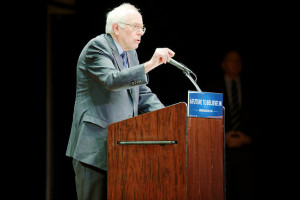
Bernie Sanders speaking, January 2016
Bernie Sanders is no doubt celebrating his narrow win over Hillary Clinton in the Michigan Democratic Primary last night, and Sanders is getting plenty of media buzz today. Unfortunately, Sanders’ win may be too little, too late, due to the cold hard math of the Democratic primaries.
Continue Reading »
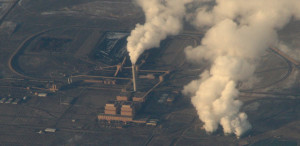
Intermountain Power Project coal-fired plant, Utah
The death of Republican U.S. Supreme Court Justice Antonin Scalia has refocused attention on how much is at stake in the 2016 presidential election. We have an ongoing series on this subject, including the president’s power to nominate Supreme Court justices and other federal court judges. Another area of great importance and great difference between the parties which is at stake in November is the future of our environment, including fighting climate change.
Continue Reading »
0 Comments -
Leave a comment! Tags: Al Gore, Anne Burford, Anne Gorsuch, Barack Obama, Bill Clinton, Christie Todd Whitman, climate change, Department of the Interior, environment, EPA, Gale Norton, George W. Bush, James Watt, President, Richard Nixon, Ronald Reagan, White House
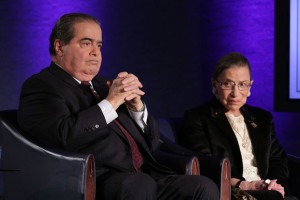
U.S. Supreme Court Justices Antonin Scalia and Ruth Bader Ginsburg
It is said that voters vote with their hearts in the primaries and with their heads in the general election. However, the death of right wing U.S. Supreme Court Justice Antonin Scalia at age 79 might cut that process short. In particular, in the Democratic primaries, Scalia’s death may focus voters’ attention on using their heads and strategy, which may be more associated with Hillary Clinton, and less on Clinton’s aspirational competitor, Bernie Sanders. Here are several reasons why:
Continue Reading »
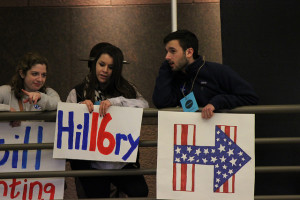
Volunteers for Hillary Clinton in Des Moines, Iowa
Right now, it’s silly season in politics. The mainstream media, the presidential primary candidates and their campaigns are serving up small shiny objects, and the public is lapping them up. On the Democratic Party side, in the primary race between Hillary Clinton and Bernie Sanders, these shiny objects range from coin tosses to speaking fees to the definition of a “progressive” to “Berniebros.” But hidden behind these superficial stories is some cold hard math involving delegates and demographics.
Continue Reading »
0 Comments -
Leave a comment! Tags: 2016 Elections, Bernie Sanders, delegates, Democratic Party, Democratic primaries, Hillary Clinton, Iowa Caucus, Nate Silver, Nevada Caucus, New Hampshire primary, South Carolina, Super Tuesday
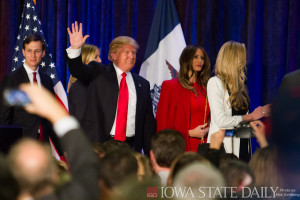
Donald Trump after giving “concession” speech at Iowa Caucus
Last night’s Iowa Presidential Caucus gave all the front-runners in the Democratic and Republican Parties something to smile about. At least, the Caucus results gave each of the following campaigns something to spin positively about:
Continue Reading »
0 Comments -
Leave a comment! Tags: 2016 election, Bernie Sanders, Democratic Party, Democratic primary, Donald Trump, Hillary Clinton, Iowa Caucus, Marco Rubio, New Hampshire, Republican Party, Republican primary, Ted Cruz
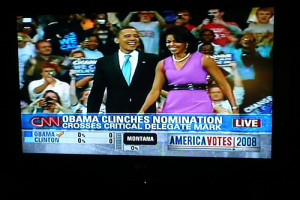
President Obama and First Lady Michelle Obama after clinching 2008 Democratic presidential nomination
Last night, one week before the Iowa Caucus, CNN hosted a Town Hall event at Drake University in Des Moines, Iowa, featuring Democratic presidential candidates Hillary Clinton, Bernie Sanders and Martin O’Malley. The three candidates showed differences in their views and policies while answering questions from the audience of mostly undecided Democratic voters and from moderator Chris Cuomo. But perhaps more striking was the level of knowledge, substance and forcefulness each candidate exhibited on the issues.
Continue Reading »
0 Comments -
Leave a comment! Tags: 2016 Elections, Affordable Care Act, Bernie Sanders, climate change, CNN, Democratic Party, Democratic primaries, Donald Trump, economy, healthcare, Hillary Clinton, ISIS, jobs, Martin O'Malley, President Barack Obama
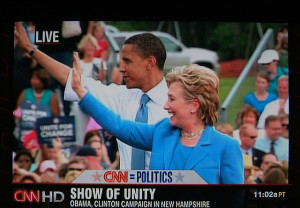
Hillary Clinton and Barack Obama in a show of unity in 2008.
A true realist might not care who wins the 2016 Democratic presidential primary contest, so long as it’s the Democrat who is most likely to defeat the Republican nominee. The prize is winning the White House, and all the advantages that entails, from nominating U.S. Supreme Court justices to conducting foreign policy to pursuing or protecting social agendas on everything from God to guns to gay marriage. We have an ongoing series about the differences between having a Democrat versus a Republican in the White House, and the list is very long. While there are differences between the Democratic candidates, those differences pale in comparison to the Republican candidates. So let’s take a realistic look at the Democratic primary race:
Continue Reading »
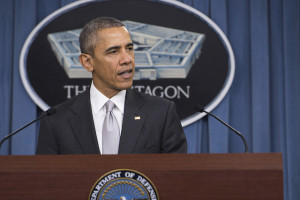
President Obama speaks at the Pentagon last December
President Barack Obama‘s final State of the Union address last night was marked by an optimistic, confident tone in promoting America’s values and its leadership position for the future. In doing so, Obama was reminiscent of two presidents who loom large in our recent history: Ronald Reagan and John F. Kennedy.
Continue Reading »
0 Comments -
Leave a comment! Tags: Barack Obama, cancer, climate change, Confederate flag, Congress, Democratic Party, Donald Trump, economy, healthcare, ISIS, JFK, jobs, John F. Kennedy, Republican Party, Ronald Reagan, State of the Union
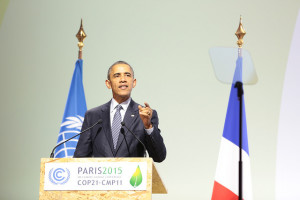
President Obama at the COP 21 climate conference in France
President Barack Obama this week signaled that he would have a robust final year in office as he announced executive actions on the registration of gun purchases, especially narrowing the “gun show loophole.” Obama also held a town hall meeting aired by CNN on Thursday to talk about his anti-gun violence actions. Moreover, just a week ago, President Obama appeared on an epic, hilarious episode of Jerry Seinfeld‘s web series “Comedians in Cars Getting Coffee.” Obama was not only very funny and relaxed, he also managed to plug his Affordable Care Act, which has covered an estimated 17.6 million more people in the past two years, causing the percentage of Americans without health insurance to drop to the lowest level ever measured. In short, President Obama is exploding the stereotype of the lame duck president.
Continue Reading »
0 Comments -
Leave a comment! Tags: Affordable Care Act, Barack Obama, climate change, CNN, economy, EPA, gun control, gun violence, guns, ISIS, jobs, Keystone XL, Obamacare, Second Amendment, State of the Union, TPP, Trans-Pacific Partnership












